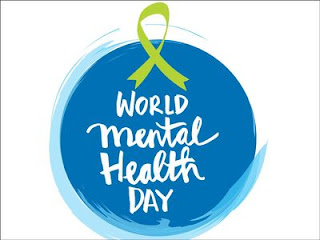I'm a day late with this post, mostly because I wasn't quite sure how to write it. But it's an incredibly important date that shouldn't go overlooked. Here are some statistics to let process in the back of your mind:
- 1 in 5 adults in the U.S. experienced some level of mental health issue in 2018. That's over 47 million people. That is roughly the population of all of California and Georgia combined.
- 1 in 25 adults in the U.S. experienced some sort of serious mental health in 2018.
- Over 16% of youth in the U.S., ages 6-17, experienced mental health disorders in 2018.
- 43% of adults who suffer with mental health disorders received treatment in 2018.
*Guys, that's less than half!
- The average delay between the manifestation of the first symptoms of mental health and proper treatment is 11 years.
I find these numbers staggering. I find them heartbreaking. And I think we can do better. In 3 days it will be the 5 year anniversary of my bipolar II diagnosis. Yet my first symptoms manifested 17 years ago. Possibly as far back as 20 years. Just last month (Sept.) I hit the 1 year anniversary of my current medication regimen. It took nearly 4 years for me to find the right combination. And I'm considered one of the lucky ones.
Getting to where I am today was perhaps the most difficult thing I've ever gone through - both physically and mentally. I recently came across an old journal entry I wrote in the early days of my bipolar disorder (BD) diagnosis and it cleared the fog as I realized in reading it how far I've truly come since that time. Some days it doesn't always feel that way, but that journal entry put a whole new perspective on where I am today.
I couldn't have done any of this without the support system that I have. Support from my doctors, support from my family, support from my friends, and support in my faith. I have a hard time reaching out sometimes. Sometimes it's because I simply don't recognize the changes in myself. But fortunately, I have people so close to me that they spot those red flags incredibly early on. And sometimes I don't reach out because I'm simply ashamed of my decline (either a depressive episode or a hypomanic episode). I will think to myself, "I've done everything right, yet here we go!" And then I feel I've failed. But when I'm stable and riding in a healthy space I remember that I will always cycle. It's not about preventing cycling. That is impossible. It's about identifying it early enough to intervene. It's about reducing both severity and frequency.
It's okay to talk about suicide.
Suicide is the 2nd leading cause of death in the U.S. for people between the ages of 10-34. It is the 10th leading cause of death in the U.S.I've seen first-hand the devastating impact that suicide has on people. We need to be having open conversations about suicide. That dialogue shouldn't begin afterward. The stigma behind suicide is often the misunderstanding that there is some kind of character flaw in the person, that it is a sign of weakness. There is often this idea that someone who is depressed needs to just forge ahead, just push through, that sunny days are coming. But it is not that simple. If it was, these numbers wouldn't be what they are. That is a very narrow and inaccurate perspective. Suicide and self-harm are symptoms of severe mental health disorders. Some of them we can see in those we love, others we don't. Being open about the conversation early on and providing avenues for support can go a long way in helping prevent this tragedy.
We stop the stigma by educating ourselves, by understanding the root of the causes of suicide. By learning how we can offer support. We can't be afraid to have the hard conversations.
So on this World Mental Health Day, I encourage you to be open, to not hide behind a cloud of shame. Educate yourself on the signs of suicide and mental health. Learn how you can support someone you love who suffers. And if you are the one who suffers, I can't stress enough how important it is to get help. Proper treatment is one of the best ways to help prevent this tragedy, and you should never be ashamed to admit when you need help. Mental health disorders are just that, disorders. They're not a result of anything anyone has or hasn't done.
Here's all my love, to all of you out there, from someone who knows all too well what it's like to both soar high and plunge deep. You'll always have a friend in me.
*statistic source: NAMI






No comments:
Post a Comment